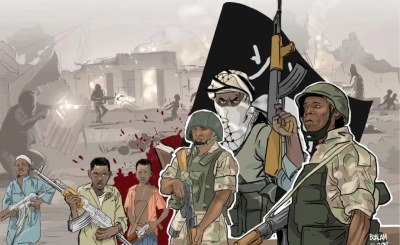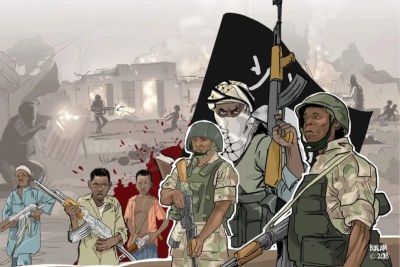-
Nigeria: Country's Rampant Banditry, and Some Ideas On How to Rein It in
The New Humanitarian, 8 November 2021
'The problem is that the peace deals negotiated so far are badly flawed and amateurishly executed.' Read more »
-
Nigeria: Bandits' Siege to Abuja
Vanguard, 9 November 2021
IT was only a matter of time before the terrorists which the Federal Government refers to as "Bandits" would descend on Abuja, the Federal Capital Territory. Read more »
-
Nigeria: Bandits Attack Zamfara Village, Kill 6, Abduct Many
Vanguard, 9 November 2021
Gunmen suspected to be bandits have attacked Rijiya village in Gusau Local Government Area of Zamfara State, during which they killed six people and several others abducted. Read more »
-
Nigeria: We've Neutralised 250 Bandits, Captured 600 - Irabor
Premium Times, 14 October 2021
The CDS says the bandits were neutralised and captured in Zamfara and parts of Niger, Sokoto and Kaduna States. Read more »
-
Nigeria: Country Responds As Banditry Overwhelms States, Causes Hardship
Nation, 4 October 2021
"The past 18 months have been some of the most difficult periods in the history of Nigeria. Read more »
-
Nigeria: Re - Insurgency, Seccessionism and Banditry Threaten Nigeria
This Day, 29 October 2021
The Nigerian army deserves praise, reckons Gbenga Adesanya. Read more »
Nigeria's Rampant Banditry and Some Ideas On How to Rein It in
They are known simply as "bandits" - heavily armed criminal gangs that have terrorised Nigeria's rural northwest, killing, kidnapping, forcing people from their homes, and taunting the authorities with their brazenness.
The raids are increasingly daring. In the last few months, bandits have downed an air force jet, attacked the military's officer training school, struck a prestige commuter rail service running between the capital, Abuja, and the city of Kaduna and kidnapped students for ransom from schools and colleges so many times that education is now in peril, writes Idayat Hassan for The New Humanitarian.
Zamfara, one of Nigeria's poorest states, is at the centre of the banditry. It tops the country's league table of violent deaths, with 495 reported killings between July and October 2021. That's far more fatalities than northeastern Borno, where Islamic State in West Africa Province (ISWAP) and Boko Haram operate.
To try and stem the spreading chaos, some state governments have turned to peace deals to essentially buy off the gunmen. The model is the oil-rich Niger Delta from a decade ago, where militants protesting the government's exploitation of the area accepted amnesty deals and development programmes to end attacks on oil facilities.
At least 10 military operations have been launched against banditry in the northwest so far, but they have failed to make a dent in the insecurity. The mobile gangs take advantage of a forested, sparsely populated region, and when attacked, simply move elsewhere.
InFocus
-
Since 2015, parts of northern Nigeria have witnessed a steady increase in insecurity and violent attacks. Civilians and government security forces have been the victims. ... Read more »
-
Kaduna State, in efforts to address rising insecurity, has asked telecommunications firms to suspend their services for three months. The state has also banned the use of ... Read more »



